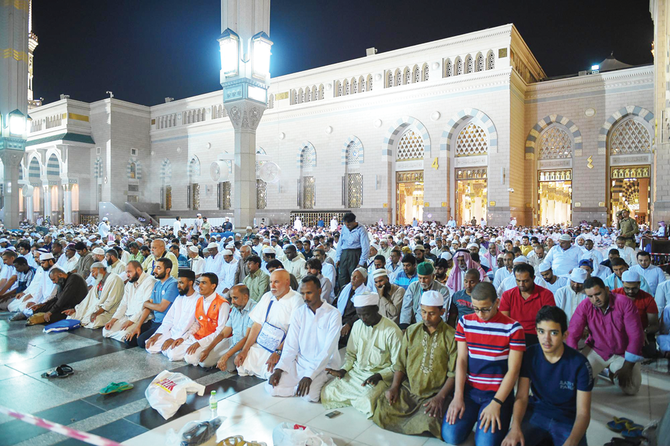JEDDAH: Worshippers performed the second Taraweeh prayer on the second night of Ramadan at the Prophet’s Mosque in Madinah on Thursday, amid an integrated system of services provided by the Kingdom’s government.
The crowd of worshippers — citizens, residents and visitors — arrived in Madinah early to perform the night and Taraweeh prayers amid a spiritual and peaceful atmosphere.
Government bodies provided all convenient means to visitors and worshippers under the supervision of Crown Prince Mohammed bin Salman, Madinah Gov. Prince Faisal bin Salman and Deputy Gov. Prince Saud bin Khalid Al-Faisal, who are committed to helping worshippers perform their pilgrimage in an atmosphere of safety, security, peace and tranquility.
The General Presidency for the Affairs of the Prophet’s Mosque exerted all possible efforts to provide services to visitors and worshippers, allowing them to perform their prayers with ease.
The presidency opened the mosque’s doors, covered maintenance, hygiene and watering, multiplied the workforce and deployed its personnel throughout the mosque’s compound to organize the crowd, and opened passages inside the mosque and its compounds.
The presidency also provided all orientation and guidance services, Qur’ans and Zamzam water.
With large numbers of pilgrims and visitors attending, security officials exerted all possible efforts to organize and ease their access into the Prophet’s Mosque.
A significant increase in the number of worshippers visiting the Prophet’s Mosque has been recorded in the first days of the holy month. They come to ask God to have mercy on them, forgive them and answer their prayers.
This comes amid the mobilization of the Presidency of the Two Holy Mosques and its efforts to provide the best care and services to the visitors to The Prophet’s Mosque in addition to the rest of the relevant authorities that organized their work and focused all their efforts on providing the best services in order to keep up with the increase in the number of visitors during Ramadan.
The Presidency of the Two Holy Mosques offers many services to the pilgrims. It set “spray fans” on the pillars located in the mosque’s squares to spray water in order to temper the hot environment.
It also provided Zamzam water in “refrigerators” distributed in the outer squares as well as in special containers inside the mosque.
The Presidency supervises the organization of “iftar of the fasting” and monitors the food allowed in the mosque according to certain health requirements.
A number of scholars and preachers are found inside the Prophet’s Mosque in different locations.
They provide daily lessons and show the visitors how to properly worship according to the guidance of Prophet Muhammad in addition to answering their questions. Qur’an memorization circles are also found in various places in the mosque.
Worshippers also performed second Taraweeh prayers at the Grand Mosque in Makkah in an atmosphere of faith dominated by reverence.

































